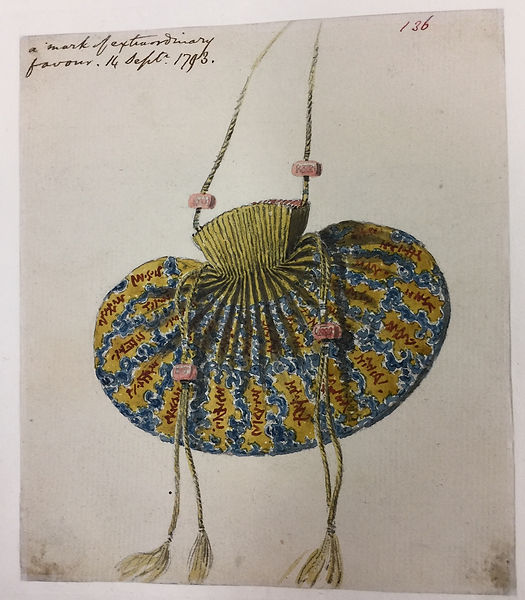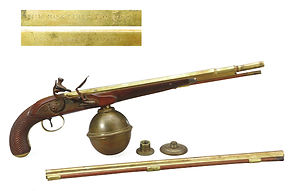The Amherst embassy of 1816
A great many scholarly books and essays have been produced about the Macartney embassy (1792-94) in the 20th and 21st centuries. By comparison, not much has been written about the Amherst embassy (1816). It is as if both countries, namely Britain and China, wanted to forget that the event had ever taken place.
Both embassies had the endorsement of the British monarch, but there was one big difference. Henry Dundas, the Secretary of State, instigated the Macartney embassy, and he had very clear idea of what he wanted from the Chinese emperor, although his objectives were not accomplished. The Amherst embassy, on the other hand, was initiated by the English East India Company (EIC). In 1816 the EIC’s charter had only another seventeen years to run, and what the Court of Directors hoped to achieve by sending an embassy to China was not at all clear. Lord William Pitt Amherst and his entourage left Spithead on the Alceste on February 2nd, 1816, but the EIC notified the Guangdong authorities only on June 4th. Surely had the embassy been a relationship-building exercise it would have given China plenty of advance notice? If one checks the Macartney embassy records one can see that the EIC notified China five months before Macartney set sail, not four months after, as in Amherst’s case.
The one person most dejected to see the arrival of the Alceste outside Macao in early July was Sir George Thomas Staunton, the newly-promoted chief of the EIC Canton factory. Staunton went to Beijing as Macartney’s page in 1792, when he was a mere 12-year-old. He joined the EIC in 1800, and had become President of the Select Committee in Canton after sixteen years of service. Not a bad career progression - one would say, but Staunton had higher ambitions. He had always considered himself the most suitable man to serve as ambassador to China. He knew the Chinese people and the Chinese language very well, and, more importantly, the attention paid to him by Emperor Qianlong back in 1793 had gone to his head. For years he had been urging the British government to renew its diplomatic relations with the Qing court. One can imagine his disappointment when, finally, the British government decided to send another embassy to China, but had given the ambassadorship to someone else.
As a matter of fact Staunton was not even appointed number two of the embassy. Henry Ellis, who came out from England with Amherst in the capacity of “secretary”, had been furnished with dormant credentials as “minister plenipotentiary”, to be used in the event of the death or absence of Amherst.
What happened afterwards was a history too well-known to warrant reiteration. Writing in 2000 Patrick Tuck, editor of Britain and the China Trade 1635-1842, gives his opinion that “the inclusion of Staunton effectively doomed the embassy from the start”. That opinion I entirely agree with. I myself have often wondered what sort of ending the 1816 embassy would have if Amherst had gone to Beijing without Staunton. He might still have refused to perform the “kowtow”, and in all probability he would have gone home empty-handed. But the embassy probably would not have been dismissed in such an undignified manner.
At this juncture I would like to point out a second big difference between the Macartney embassy and the Amherst embassy. No one in Macartney’s entourage was in the employ of the EIC, whereas there were six EIC men who went to Beijing with Amherst. In other words Amherst and Ellis were the only “outsiders”. Staunton often boasted that his “local knowledge and experience” was much sought after by politicians in Westminster, but it was exactly that local knowledge and experience that caused the Amherst embassy to fail. On the one hand the notoriety of the EIC had reached Beijing. On the other hand the EIC men had for a long time loathed and despised the Guangdong officials, so much so that their attitude did not change when they faced the officials from Beijing in 1816. If there were a hope of achieving any kind of agreement it was for the two outsiders Amherst and Ellis, who held no pre-conditioned views about the Chinese officials, to start negotiation with a clear head and less personal emotion. Unfortunately for both Britain and China that did not happen. Amherst chose to listen to Staunton, resulting in the entire delegation being unceremoniously dismissed before the Ambassador could enter the audience hall of the Yuanming Yuan.
However highly Staunton might have thought of himself he could not evade responsibility, and had to resign from the EIC. Forty years later, when he was 75 years old, he unabashedly claimed, in his memoirs, that
although this mission has often been stigmatised as a failure, it was practically, perhaps, the most successful of any that had ever been sent to Pekin by any European power; for it was followed by a longer interval of commercial tranquility, and of freedom from annoyance, than had ever been experienced before.
Staunton probably thought that his fellow countrymen had a very short memory, or that no one would take the trouble to check past records. Today one can look up any event that happened forty years ago by spending twenty minutes on the internet, but in the 1850s it was not that easy.
By 1856, the year he published his memoirs, Staunton had been a Member of Parliament for nearly 35 years. But he had always wanted to be seen as a China expert. On the title page of his memoirs Staunton describes himself as “one of the King’s commissioners to the court of Pekin, and afterwards for some time Member of Parliament for South Hampshire, and for the Borough of Portsmouth”. He desperately wanted to tell his readers that he was once sent by the King on a diplomatic mission to China. Such an obsession had its origin in 1793, when Emperor Qianlong gave him a silk purse. “A mark of extraordinary favour”, he told the painter William Alexander, who made a drawing of the purse.

Drawing by William Alexander, 1793, © British Library
Equally, when he was working for the EIC in Canton he made similar efforts to impress the Guangdong officials that he was the recipient of Emperor Qianlong’s special favour. In 1805 Dr Alexander Pearson, a physician working for the EIC, tried to introduce vaccination against smallpox to the Chinese people in Canton and Macao. A small pamphlet in Chinese was produced, in which the names of three Englishmen were mentioned, namely the EIC chief James Drummond, the physician Alexander Pearson, and the translator George Thomas Staunton. To his own name Staunton added a long descriptive phrase “hereditary baronet, has been in the British delegation that were admitted into the Emperor presence in Qianlong 58th year”. Judging from subsequent events in Canton it would seem that the Guangdong officials were not in the least awed by those pretentious titles.

Page from the pamphlet on vaccination against smallpox, printed in 1805
Modern historians in China are not too keen to write about the Amherst embassy, because they know only too well that the biggest blunderer was Emperor Jiaqing himself. Traditionally Chinese historians did not write about the wrongdoings of emperors or rulers, and that tradition is still going strong in the 21st century. But one only has to look at the facts to realise that Jiaqing was a very inadequate ruler. He treated the high-ranking officials very badly, thus no one exert himself to exterminate insurrections and piracy. Externally, he wanted deference from China’s tributary states, but would not go to their aid when they were attacked by their enemies. As a result he could command neither respect from foreign countries nor obedience at home.
In the case of the Amherst embassy Emperor Jiaqing gave his hapless ministers, first Sulenge and then He Shitai, an impossible job. His instruction to He Shitai was
it would be ideal if you could make the envoys comply and come to the Capital to perform the ceremony. If they persist in their erroneous behaviour you should inform me and wait for my further instruction.
That “ideal” scenario did not occur, and He Shitai had to tell Jiaqing that the English envoy absolutely refused to perform the kowtow. However, Amherst’s refusal to go into the audience hall until he had time to refresh himself gave Jiaqing an excuse to save face. He issued an edict saying that the English envoy did not appear when summoned because his formal attire had not yet arrived, implying that “kowtow” was not an issue. The Emperor then very conveniently laid all the blame on He Shitai and Sulenge.
With a few exceptions Chinese people today do not want to talk about the mistakes made by Emperor Jiaqing in the Amherst incident. But they would gladly talk about George Thomas Staunton. An ordinary Chinese person in the street would say that Staunton was an ungrateful man. Emperor Qianlong showered him with gifts, yet he repaid the Emperor’s kindness with hostility, first by advising Amherst not to perform the kowtow, then by voting to go to war with China in the parliamentary debate in April 1840. That last act is particularly repugnant to the Chinese people, since the “go to war” motion won by a very narrow margin.


